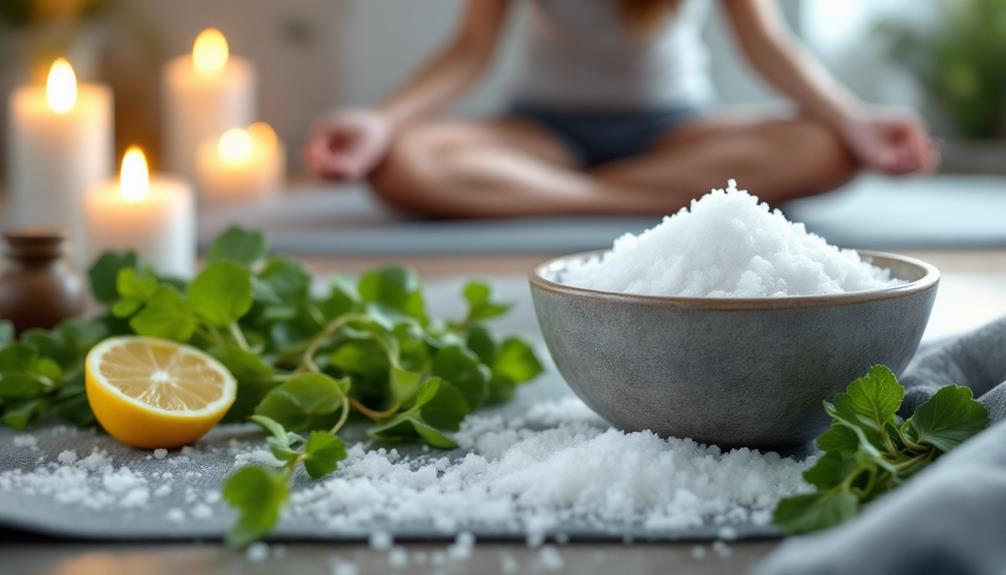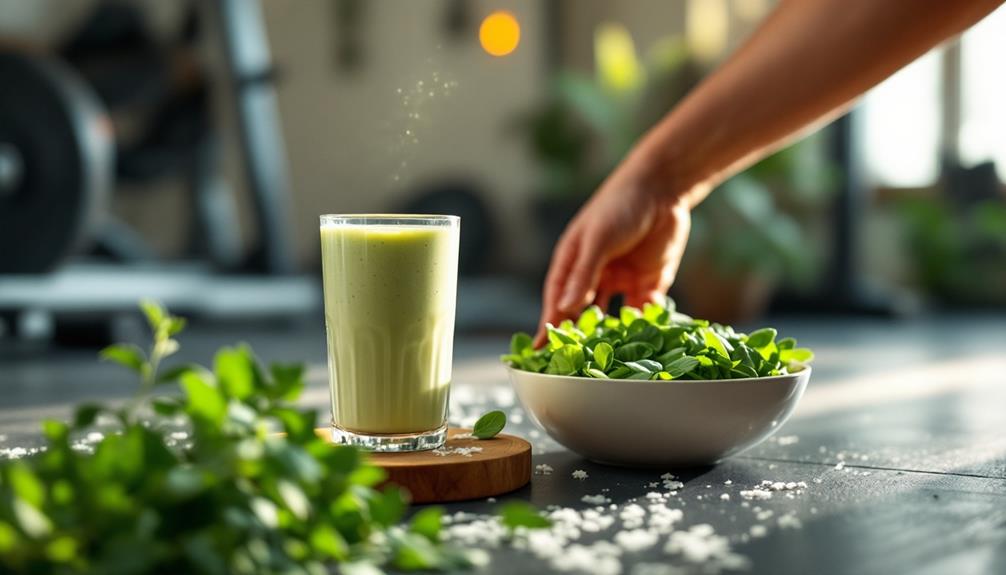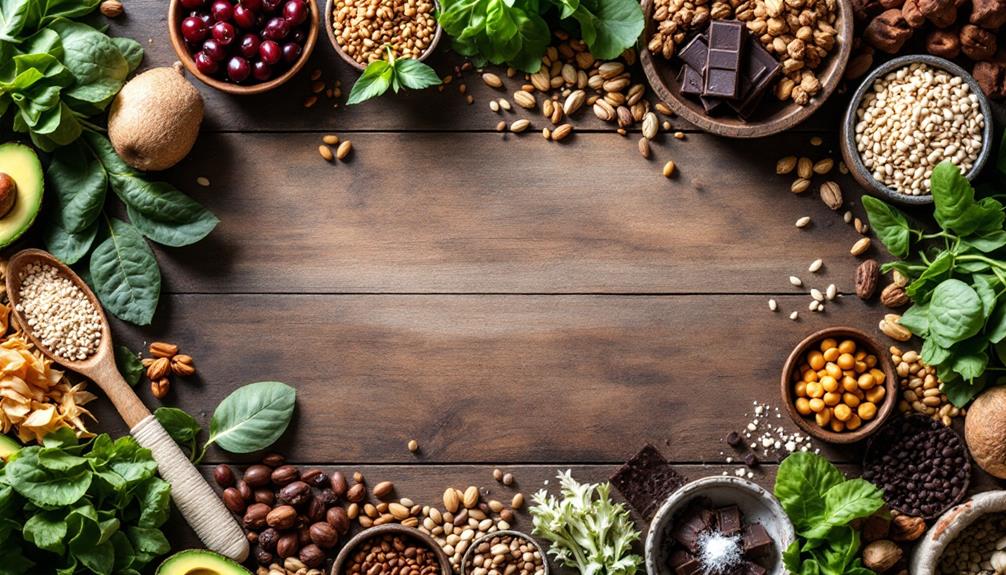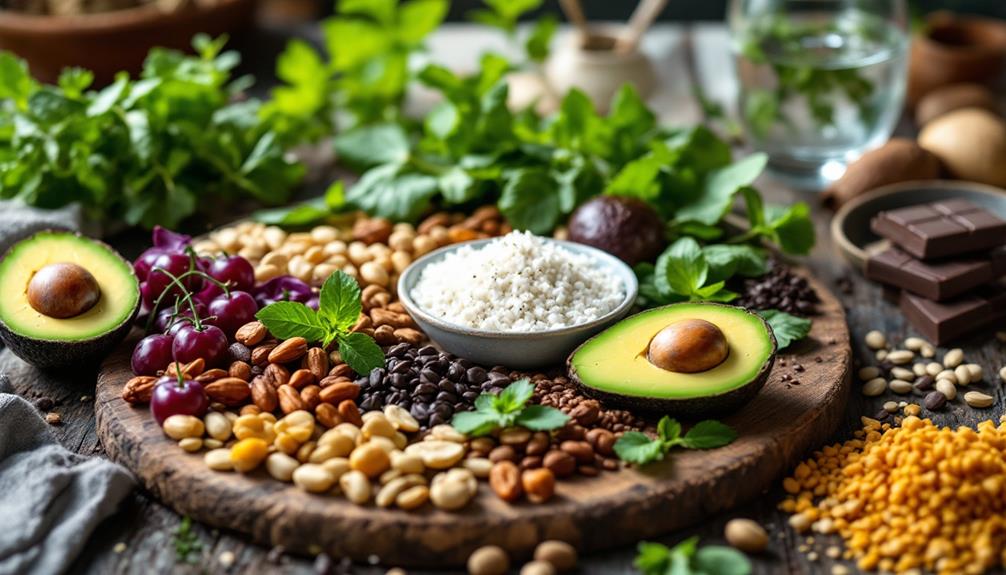To use magnesium for optimal muscle recovery, start by incorporating magnesium-rich foods into your diet, such as leafy greens, nuts, seeds, and whole grains. Aim for a daily intake of 250-600 mg, depending on your activity level. You can also consider supplements like magnesium citrate or glycinate, especially after workouts or before bed for better absorption. Pair magnesium with vitamin D and stay hydrated to enhance its efficiency. Watch for potential side effects, like stomach issues or low blood pressure. Understanding how magnesium aids recovery can improve your performance and well-being—there's more to explore on this topic.
Core Insight
- Incorporate magnesium-rich foods like leafy greens, nuts, seeds, and whole grains into your diet for better muscle recovery.
- Consider magnesium supplementation options such as Magnesium Citrate or Magnesium Glycinate to meet your needs.
- Timing is essential; consume magnesium after workouts, before sleep, or with meals for optimal absorption.
- Aim for recommended dosages based on your activity level: 400-600 mg for endurance athletes, 250-350 mg for recreational athletes.
- Pair magnesium intake with Vitamin D and stay hydrated to enhance absorption and effectiveness.
Importance of Magnesium for Recovery

Understanding how important magnesium is for muscle recovery can really improve your post-workout routine. This mineral is vital for many bodily functions that help you recover effectively. Magnesium helps your muscles relax after a workout by regulating muscle contractions. It also supports energy production, which means your body can refill its energy stores more quickly.
Taking Epsom salt baths is a great way to absorb magnesium through your skin, providing extra help for muscle recovery. Without enough magnesium, you might feel more muscle soreness, fatigue, and take longer to recover. Adding magnesium-rich foods like spinach, nuts, and whole grains to your diet can make a big difference in how quickly you bounce back.
If you find it hard to get enough magnesium from food, think about taking supplements. Making magnesium a priority can help you recover faster and perform better in your next workout.
Benefits of Magnesium for Muscles

Many athletes and fitness fans often forget how important magnesium is for muscle health. This vital mineral plays a key role in how your muscles work and recover. It helps control muscle contractions, which keeps you performing well during workouts. Plus, magnesium helps produce energy, enabling you to get the most out of your training sessions.
Here's a quick look at how magnesium benefits your muscles:
| Benefit | Description | Impact on Performance |
|---|---|---|
| Muscle Relaxation | Reduces cramps and tightness | Speeds up recovery |
| Energy Production | Helps make ATP (energy) | Increases endurance |
| Protein Synthesis | Supports muscle repair and growth | Boosts strength gains |
| Electrolyte Balance | Keeps hydration levels steady | Enhances overall function |
Incorporating enough magnesium into your diet can help you perform better and recover faster.
Dietary Sources of Magnesium

To help your muscles recover and support your overall health, it's important to eat foods rich in magnesium. This mineral is crucial for how your muscles function, so make sure you're getting enough. While Epsom salt baths can give you some magnesium through your skin, it's also essential to include dietary sources in your meals. Here are three great options for getting more magnesium into your diet:
- Leafy Greens: Spinach and Swiss chard are loaded with magnesium. They can easily be added to salads or blended into smoothies.
- Nuts and Seeds: Almonds and pumpkin seeds are excellent sources of magnesium. They also provide healthy fats and protein, making them perfect snacks after a workout.
- Whole Grains: Brown rice and quinoa are nutritious choices that are easy to include in many dishes.
Magnesium-Rich Foods to Include

Including magnesium-rich foods in your diet is important for muscle recovery and overall health. Start with leafy greens like spinach and kale, which are high in magnesium. Nuts and seeds, such as almonds and pumpkin seeds, are great options too and make easy snacks.
Whole grains like brown rice and quinoa also provide magnesium and help with digestion. Don't forget legumes, like black beans and lentils; they are versatile and can be added to many dishes. Lastly, consider fatty fish like salmon, which offers magnesium and healthy omega-3 fatty acids.
Supplementation Options for Magnesium
- Magnesium Citrate: This form is well-absorbed by the body and is often recommended for easing muscle tension and helping with recovery. If you prefer an alternative way to use magnesium, topical sprays can target sore muscles directly.
- Magnesium Glycinate: This type is easy on the stomach and can help you feel calm, making it a great choice after a workout.
- Magnesium Oxide: While it doesn't absorb as well as other forms, it is frequently used for its mild laxative effects and can help increase your overall magnesium levels.
Before starting any supplements, it's a good idea to talk to a healthcare professional. They can help you choose the best option for your needs and lifestyle.
Recommended Dosages for Athletes

Getting the right amount of magnesium is important for athletes who want to boost muscle recovery and performance. The daily recommended intake can change based on age, gender, and how active you are. For most athletes, taking between 300-400 mg each day is a good target. However, individual needs can vary.
Here's a simple guide to recommended dosages:
| Athlete Type | Recommended Dosage (mg) | Notes |
|---|---|---|
| Endurance Athletes | 400-600 | Lose more magnesium |
| Strength Athletes | 300-500 | Helps with muscle function |
| Recreational Athletes | 250-350 | Basic recovery needs |
| Older Athletes | 350-500 | Need more for recovery |
Always talk to a healthcare professional before starting any supplements to make sure they fit your health needs.
Timing Your Magnesium Intake

To help your muscles recover better, it's important to think about when you take magnesium. Here are three great times to consider:
- After Your Workout: Taking magnesium right after you exercise can help refill your body's stores and support recovery. Using topical magnesium sprays can be especially helpful for sore muscles because they absorb quickly.
- Before Sleeping: Taking magnesium at night can help you relax and sleep better, which is essential for your muscles to repair.
- With Your Meals: Eating magnesium-rich foods during meals can improve how well your body absorbs this important mineral.
Potential Side Effects and Risks

Magnesium can be helpful for muscle recovery, but it's important to know about possible side effects and risks. Using topical magnesium sprays may be a good alternative to oral supplements, as they might reduce stomach issues like diarrhea or cramps, which can occur with high doses of oral magnesium.
However, taking too much magnesium can cause more serious problems, such as an irregular heartbeat or low blood pressure. If you have kidney issues, your body may have a harder time processing magnesium, which can increase the risk of toxicity.
It's always best to talk to a healthcare professional before starting any supplement, especially if you're taking medications or have health conditions. By staying informed and cautious, you can enjoy the benefits of magnesium while minimizing the chances of experiencing unwanted side effects.
Tips for Maximizing Magnesium Absorption

Maximizing magnesium absorption is important for muscle recovery. Here are three simple tips to help you get the most from your magnesium intake:
- Pair with Vitamin D: Eat magnesium-rich foods with sources of vitamin D, such as fatty fish or fortified dairy. This pairing boosts absorption. Remember, vegan collagen boosters can also aid muscle health and recovery when used with magnesium.
- Choose Whole Foods: Opt for natural sources of magnesium like leafy greens, nuts, and whole grains instead of only taking supplements. Whole foods offer extra nutrients that help with absorption.
- Stay Hydrated: Drink plenty of water throughout the day. Staying hydrated helps your body use magnesium better and supports overall recovery.
Frequently Asked Questions
Can Magnesium Improve Sleep Quality for Better Recovery?
"Early to bed, early to rise, makes a man healthy, wealthy, and wise." Yes, magnesium can improve your sleep quality, helping you recover better. It relaxes your muscles and calms your mind for restful nights.
Is Magnesium Effective for Muscle Cramps and Spasms?
Magnesium's been shown to help reduce muscle cramps and spasms. If you're experiencing tightness, consider incorporating magnesium-rich foods or supplements into your routine, as they may ease discomfort and promote better muscle function overall.
Are There Specific Magnesium Types Better for Athletes?
When you're exploring magnesium types, you'll find that magnesium citrate and glycinate are often favored by athletes. They're easily absorbed and can enhance your performance, making recovery smoother and more effective after intense workouts.
How Does Magnesium Interact With Other Supplements?
Magnesium interacts with various supplements by enhancing absorption and effectiveness. It can improve the efficacy of vitamin D and calcium, while also balancing electrolytes. Just be mindful of potential interactions with certain medications you might be taking.
Can I Get Enough Magnesium From a Vegan Diet?
Yes, you can get enough magnesium from a vegan diet. Focus on foods like leafy greens, nuts, seeds, and whole grains. Just make sure you're balancing your meals to meet your nutrient needs effectively.

